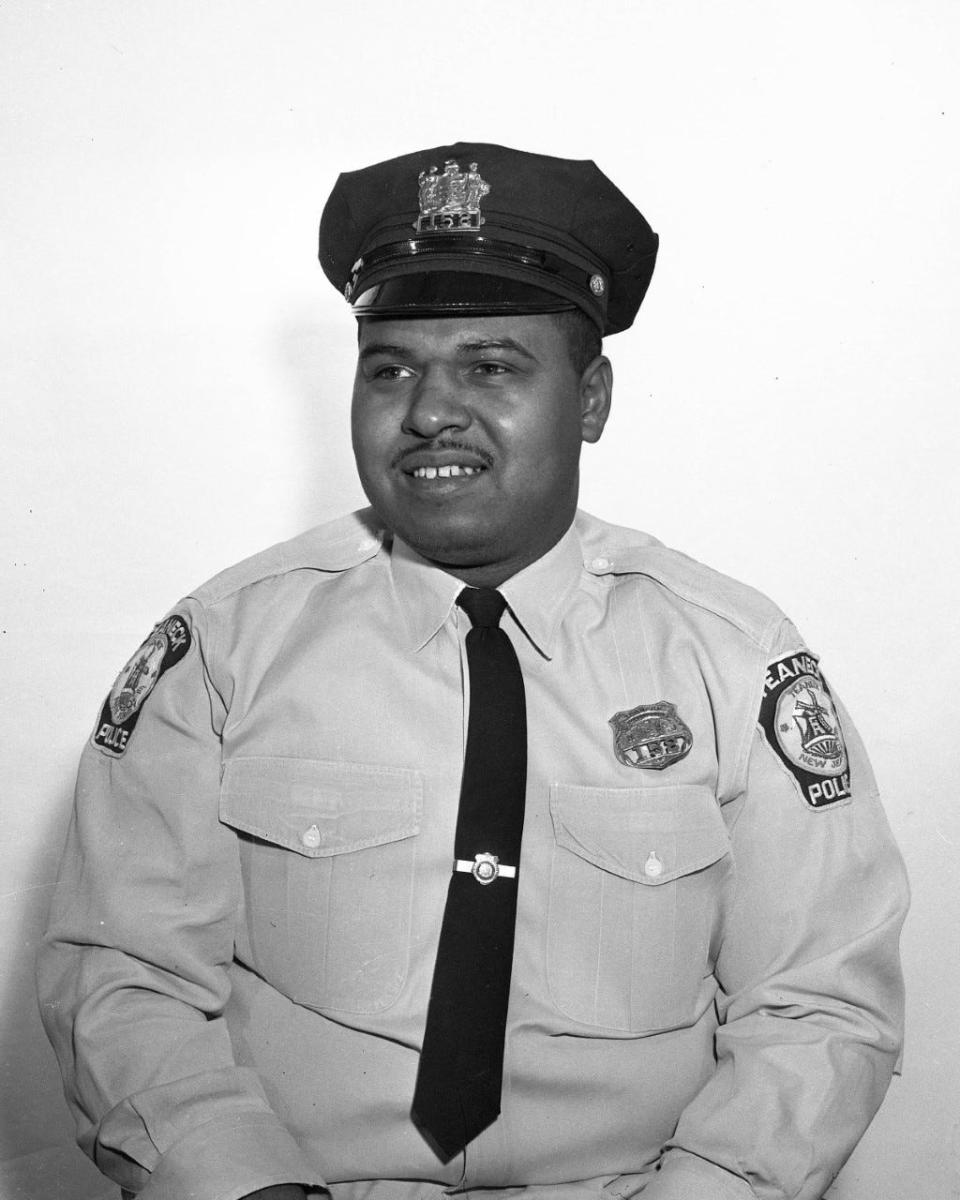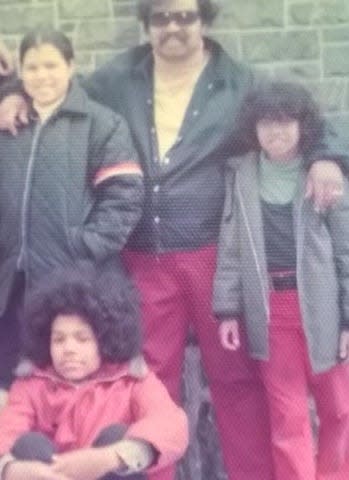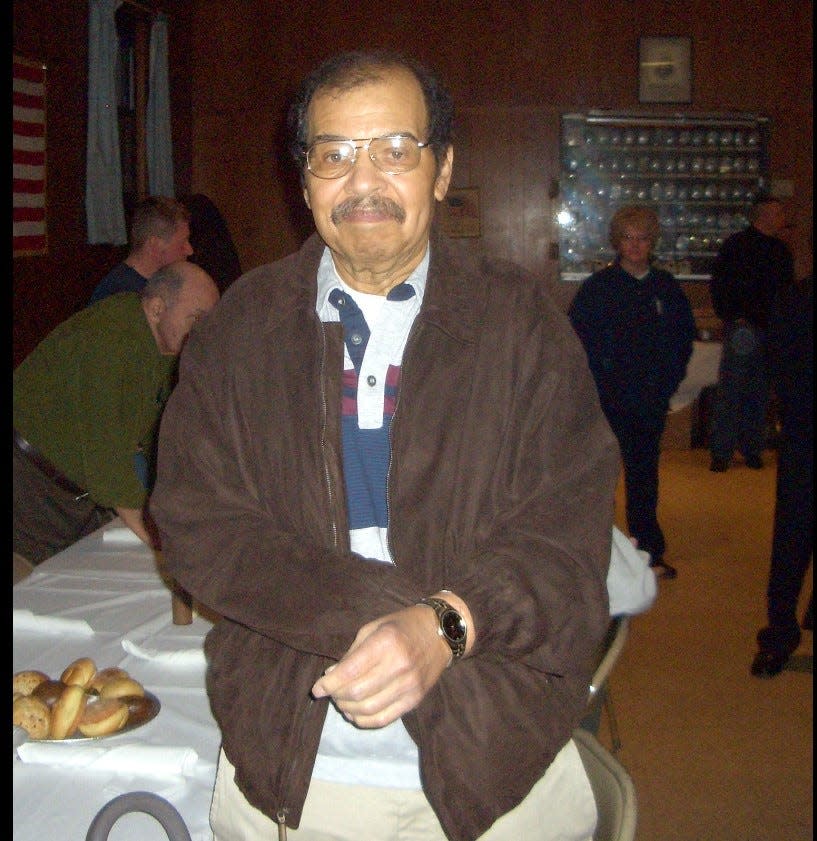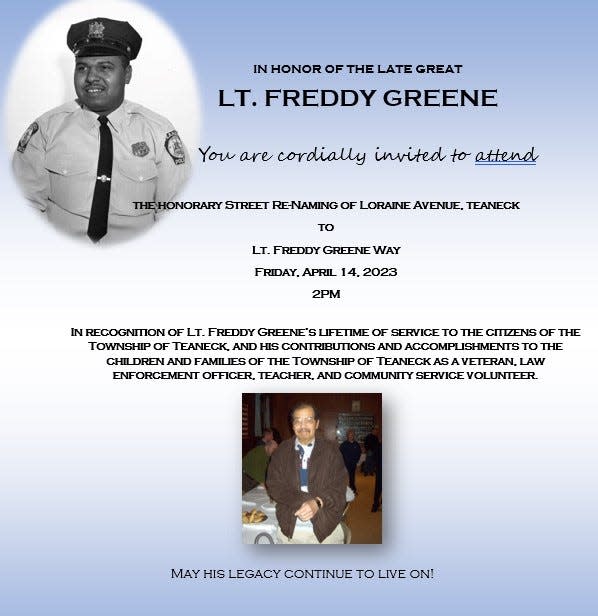Teaneck to honor and remember Freddy Greene, township's first Black police officer
TEANECK — The story goes that when Freddy Greene was named the township's first Black police officer in 1962, a shot was fired through his Loraine Avenue home and his parents took turns standing guard on the front porch armed with a shotgun.
And yet, sons Rick and John say they never heard a word from their father about prejudice or bigotry at home or in public during his 26 years on the force, or up to his death in May 2008.
Greene will be celebrated Friday at a ceremony in front of that house, with the temporary renaming of that block of Loraine Avenue in his honor.

"Freddy Greene was a trailblazer and inspiration to thousands of families and kids growing up in Teaneck, including me," Mayor Michael Pagan said Monday. "He was kind, compassionate and always there to help people. We love him and we miss him."
Greene was born in Englewood in November 1936 and the family moved to Teaneck, where his father, John Greene, worked as a disposal operator for 25 years. He graduated from Teaneck High School in 1956 with varsity letters in football, basketball and baseball. After three years in the military, he was working as a mechanic when he was hired by the township's Police Department.
"He tested No. 1, but they were very hesitant to appoint him," said Leo Wielkocz, the township's health officer at the time. "There was a thought that maybe there would be a problem with other police officers accepting him. There was trouble getting used to the influence of city people moving in. Integration was a big battle."
TEANECK JAZZ CLUB New jazz dinner club opens on New Jersey's side of the Hudson River
Teaneck became the first town in the U.S. to integrate its schools through bussing with a school board vote in 1964, but Greene's sons said they were unaware of the controversies swirling around them.
"He shielded us. He never brought racism into our home," said John Greene, who also graduated from Teaneck High School, in 1983. "Racism never entered our minds. We played sports together. It was not a factor."

While aware their father was a police officer, what his sons most recall was his refusal to carry a gun for most of his career.
"He hated guns," Rick Greene said. "He looked for peaceful ways to disarm people. He was everybody's second father, their big brother."
In one case, Greene was called to the home of a man wielding a machete knife at his parents. According to Wielkocz, when asked what he would do, Greene told the sergeant, "The Fire Department is on its way."
"The Fire Department turned their hose on the son and were able to contain him without shooting him," Wielkocz said. "That was Freddy, always looking to be innovative about policing."
SCHOOL BULLYING Is it bullying? Frustrated NJ parents often enter murky waters when school says it's not
In another innovative move, Freddy Greene manipulated a suspect into leaving his handprints on Greene's patrol car. The car was dusted, and the suspect was subsequently linked to a series of crimes.
Greene initiated a variety of "community policing" programs to engage the town's youth, including teen dances at the town hall, its first youth recreation center, the "Pieces of Africa" youth organization with a choir and dance troupe, and Teaneck's Motocross Bicycle Organization, giving kids a place to ride their bikes in Votee Park.
Rick Greene noted that his father coached a variety of sports, in some cases pulling together a team of "misfits" just to engage them in some constructive activity without caring if they won or lost.
"I was a scorekeeper at one game where the other town was not too welcoming of a Black team, and when Teaneck won, they chased us to the parking lot throwing rocks," Rick Greene said. "I remember my father covering one player's head with his hands to keep him from getting hurt."

Greene was promoted to detective on the narcotics squad in 1968 and to sergeant in 1970, put in charge of a special squad targeting youth crime prevention. He was promoted to lieutenant in 1978. Even two years after his retirement in 1988, The New York Times still contacted him to comment on the controversial shooting of Black 16-year-old Phillip Pannell by white Teaneck Officer Gary Spath.
"I don't think I saw racism expressed or problems between minority officers and non-minority officers within the department," Greene was quoted as saying at the time.
Rick Greene recalled that his father bought a large van with no seats so he could "transport as many people as he could" to whatever activity was going on, even inviting neighborhood kids on vacation with his family.
"I started a gospel group at Fairleigh Dickinson and there'd be 15-20 of us rehearsing in the living room," Rick Greene said. "My dad would be upstairs sleeping for the midnight shift, and when it was quiet you could hear him snoring. He never told us we couldn't practice there."

For all his community involvement, John Greene said, his dad's greatest accomplishment was "being an exceptional father."
"He coached us, taught us how to play. He could fix anything," John Greene said. "He could do everything."
The renaming ceremony will be in front of 1232 Loraine Ave. on Friday at 2 p.m.
This article originally appeared on NorthJersey.com: Teaneck to honor its first Black police officer with street renaming

